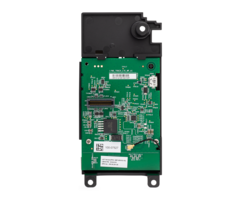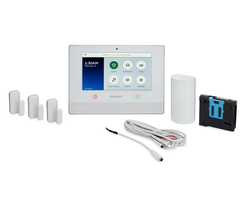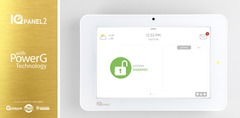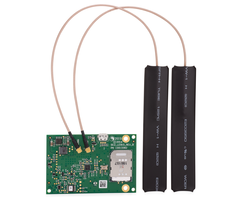Resideo AlarmNet Posts 3G Sunset Countdown Banner
Posted By Michael GorisAlarm Grid noticed a new addition to the AlarmNet360 platform for alarm dealers. There is now a banner counting down to the end of the respective AT&T 3G and Verizon CDMA network shut downs. It's another indication that the 3G Sunset is indeed a very pressing matter in the alarm industry.

If you are not familiar with the 3G/CDMA Sunset, it refers to quickly approaching dates at which the AT&T 3G Cellular Network and the Verizon CDMA Network will be permanently shut down and deactivated. Other cellular service providers also have their own dates for when they will decommission their older networks in favor of faster and more reliable LTE and 5G cellular networks. But for the alarm industry in the United States, the AT&T and Verizon shutdowns are particularly important, as many alarm systems rely on communication through these networks.
According to the banner shown on AlarmNet360, the AT&T 3G Sunset is set to occur after January 31, 2022. Likewise, the Verizon CDMA Sunset, according to the banner, will occur after December 31, 2022. We want to make it very clear that Alarm Grid is NOT stating that these are "official" dates for the respective network shutdowns. This is just what AlarmNet is displaying on their dealer portal. But it is our understanding that these dates are accurate and very important for end users to consider.
When a cellular network is shut down, any device communicating across that network will stop working. This includes many cellular alarm monitoring communicators that security systems depend upon for providing trustworthy and effective monitoring service. Inevitably, there will be many homes and businesses that fail to make the proper transition and get left behind during this period of adjustment. Our goal is to ensure that this happens to as few Alarm Grid customers as possible.
In preparation for the 3G/CDMA Sunset, AlarmNet has stopped allowing activations for these older cellular modules. Similar measures have also been taken by Alarm.com. But just because new activations are no longer permitted does not change the fact that there are many existing communicators out there.
Alarm Grid has promised to continue providing support for these modules as long as possible. We know that there are many people who aren't necessarily in a position to purchase a new communicator and/or an entirely new alarm panel right away. We're doing our best to accommodate everyone. But once an associated cellular network is shut down, there is nothing we can do. This is completely in the hands of the cellular service providers, and it is entirely out of our control. We fully understand the need to decommission older networks in favor of better technology, and we know that cellular service providers are making these decisions in the best interest of everyone involved. But we need to urge our customers. Do not get left behind.
The 3G/CDMA Sunset is not something to take lightly. There will be some homes and business that do not get the memo and/or decide to not take any action. They will be left vulnerable and unprotected. That is an unfortunate reality of the situation. But you do not need to let that happen to you or those around you. Most systems will allow you to replace an existing 3G or CDMA Communicator with a newer LTE communicator.
The term LTE stands for "Long-Term Evolution". Cellular service providers like AT&T and Verizon are planning to keep their LTE networks active and in-service for many, many years into the future, possibly even decades. The LTE networks will serve as a reliable backup for the new 5G networks, for which the infrastructure is still being rolled-out. Even as cellular technology continues to evolve and change, the LTE networks will remain as a stronghold, keeping millions of security systems monitored and protected. Cellular service providers will not let their LTE infrastructure go to waste. These networks will be there for your home or business when you need them the most.
If you haven't upgraded to LTE yet, please contact us. We will help you explore your options so that you can make an informed decision. Depending on your current equipment, you might only need to buy a new communicator. Others will need to replace entire alarm panels. Our technicians can provide more detail once we know exactly what you are working with. We understand that it might be difficult or impossible for you to purchase new alarm system equipment right now. That's fine. You still have time. But time is running out. You need to start preparing and thinking about these things now. That's why AlarmNet has slapped a giant banner marking the countdown dates. Take action now, if possible, so that you aren't racing to make an upgrade at the last minute.
For Alarm Grid customers it is important to note that, in most cases a communicator replacement will require that you work with one of our trained technicians. In some cases, this can be done without an appointment, but in many cases an appointment will be required. So please, also keep this in mind when you're planning to upgrade your equipment. If everyone who needs an upgrade waits until the last minute, the wait for an available appointment time may get longer than usual.
The best way to contact us regarding any questions or concerns you might have about the 3G/CDMA Sunset is to email support@alarmgrid.com. Please let us know about the security system equipment you currently have so that we can provide the most comprehensive and complete support possible. We may even ask for pictures of your panel and/or communicator so that we can help you to the best of our ability. Remember that our support hours for checking email run from 9am to 8pm ET M-F. We look forward to hearing from you and ensuring that your security system is kept monitored for many years to come!









